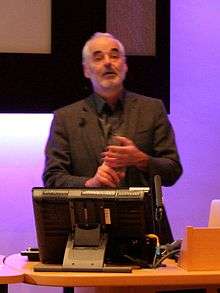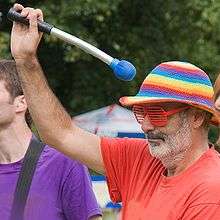David Spiegelhalter
Sir David John Spiegelhalter OBE FRS (born 16 August 1953) is a British statistician and Winton Professor of the Public Understanding of Risk in the Statistical Laboratory at the University of Cambridge[3] and a Fellow of Churchill College, Cambridge.[1][4][5][6] Spiegelhalter is an ISI highly cited researcher.
Sir David Spiegelhalter | |
|---|---|
 David Spiegelhalter presenting at the 2013 Cambridge Science Festival | |
| Born | David John Spiegelhalter 16 August 1953 Barnstaple, Devon, England |
| Nationality | British |
| Alma mater |
|
| Awards |
|
| Scientific career | |
| Fields |
|
| Institutions | |
| Thesis | Adaptive inference using finite mixture models (1978) |
| Doctoral advisor | Adrian Smith[2] |
| Website | www |
On 27 May 2020 he joined the board of the UK Statistics Authority as a non-executive director for a period of three years.[7]
Early life and education
Spiegelhalter was born on 16 August 1953.[8] He attended Barnstaple Grammar School from 1963 to 1970 then studied at the University of Oxford (Bachelor of Arts 1974), and University College London, where he gained his Master of Science 1975 and Doctor of Philosophy 1978, supervised by Adrian Smith.[2][9][10]
Career
Spiegelhalter was research assistant in Brunel University in 1976[11] and then visiting lecturer at the University of California, Berkeley, 1977–78. After his PhD, he was a research assistant for the Royal College of Physicians; he was based at the University of Nottingham, where his PhD supervisor, Adrian Smith, had been appointed a professor.
From 1981 he was at the Medical Research Council Biostatistics Unit at Cambridge. He has been an honorary lecturer at the University of Hong Kong since 1991. He has also been a consultant for GlaxoSmithKline, Novartis and the World Anti-Doping Agency. He played a leading role in the public inquiries into children's heart surgery at the Bristol Royal Infirmary and the murders by Harold Shipman.[12]
Between 2007 and 2012 he divided his work[13] between the Cambridge Statistical Laboratory (three-fifths) and the Medical Research Council Biostatistics Unit (two-fifths).[14] He left the MRC in March 2012[15] and worked full-time at the Statistical Laboratory as the Winton Professor of the Public Understanding of Risk until his retirement. He remains chair of the Winton Centre. As of 2010 Spiegelhalter has supervised at least 3 PhD students.[16]

In 2012, Spiegelhalter hosted the BBC Four documentary Tails You Win: The Science of Chance which described the application of probability in everyday life.[17] He also presented a 2013 Cambridge Science Festival talk, How to Spot a Shabby Statistic at the Babbage Lecture Theatre in Cambridge.[6][18]
He was elected as President of the Royal Statistical Society, and took up the position on 1 January 2017.
In March 2020 Spiegelhalter launched a podcast called Risky Talk where he interviews experts in risk and evidence communication on topics like genetics, nutrition, climate change and immigration.[19]
Research
Spiegelhalter's research interests are in statistics[1][20][21] including
- Bayesian approach to clinical trials, expert systems and complex modelling and epidemiology.[22]
- Graphical models of conditional independence. He wrote several papers in the 1980s that showed how probability could be incorporated into expert systems, a problem that seemed intractable at the time. Spiegelhalter showed that while frequentist probability did not lend itself to expert systems, Bayesian probability most certainly did.[23]
- Statistical software.[24] In the 1990s Spiegelhalter led the Medical Research Council team that developed WinBUGS ("Bayesian analysis Using Gibbs Sampling"), a statistical-modelling system allowing hierarchical prior distributions. WinBUGS and its successor OpenBUGS specifies graphical models using acyclic directed graphs whose nodes are random variables, which are updated using Gibbs sampling (an updating method for Markov chain Monte Carlo (MCMC) simulation).[25] Earlier Bayesian software had required that the probability distribution for the observed data be an exponential family and that the prior be its conjugate distribution. Allowing flexible choices of prior distributions simplified hierarchical modelling and helped to promote multilevel models, which became widely used in epidemiology and education.
- General issues in clinical trials,[26] including cluster randomisation, meta-analysis and ethical monitoring.
- Monitoring and comparing clinical and public-health outcomes and their associated publication as performance indicators.
- Public understanding of risk,[27][28] including promoting concepts such as the micromort (a one in a million chance of death) and microlife (a 30-minute reduction of life expectancy). Media reporting of statistics,[29] risk and probability and the wider conception of uncertainty as going beyond what is measured to model uncertainty, the unknown and the unmeasurable.
Honours
- 1975 Fellow, Royal Statistical Society
- 1985 Guy Medal in Bronze, Royal Statistical Society
- 1990 Award for Outstanding Statistical Application, American Statistical Association[30]
- 1993 Chartered Statistician, Royal Statistical Society
- 1994 Guy Medal in Silver, Royal Statistical Society
- 1994 Honorary Doctorate, Aalborg University, Denmark
- 2005 Elected a Fellow of the Royal Society (FRS)
- 2006 Received an OBE in the Queen's Birthday Honours
- 2006 Appointed Honorary Professor of Biostatistics at University of Cambridge
- 2009 Weldon Memorial Prize and Medal[31]
- 2010 Honorary Doctorate of Science, Plymouth University
- 2013 Honorary Doctorate from Heriot-Watt University [32]
- 2020 Guy Medal in Gold, Royal Statistical Society[33]
Spiegelhalter was knighted in the 2014 Birthday Honours for services to statistics.[34][35]
Media appearances
- Risky Talk (Podcast) Host of Risky Talk the podcast
- Panorama - Why Are Gambling Machines Addictive? (12 September 2016)
- Climate Change by Numbers (2 March 2015)
- Horizon - Should I Eat Meat? The Big Health Dilemma (18 August 2014)
- Horizon - What is One Degree? (10 January 2011) - Interviewed by Ben Miller
- Horizon - To Infinity and Beyond (10 February 2010)
- Tails You Win: The Science of Chance (18 October 2012)
- The Joy of Stats (7 December 2010)
Bibliography
- Sex by Numbers: What Statistics Can Tell Us About Sexual Behaviour (2015, Wellcome Collection)
- The Art of Statistics: Learning from Data (2019, Pelican)
References
- David Spiegelhalter publications indexed by Google Scholar
- David Spiegelhalter at the Mathematics Genealogy Project
- "David Spiegelhalter's Personal Home Page". Retrieved 14 September 2011.
- "Churchill College: Fellows: List of current Fellows". Retrieved 14 September 2011.
- David Spiegelhalter's publications indexed by the Scopus bibliographic database. (subscription required)
- David Spiegelhalter on IMDb
- "Appointment of two new Non-Executive Directors to the UK Statistics Authority Board". Retrieved 27 May 2020.
- "SPIEGELHALTER, Prof. David John". Who's Who. 2015 (online Oxford University Press ed.). A & C Black, an imprint of Bloomsbury Publishing plc. (subscription or UK public library membership required) (subscription required)
- Spiegelhalter, David (1978). Adaptive inference using finite mixture models (PhD thesis). University College London.
- Keeble, Andy (18 June 2014). "Barnstaple old boy knighted in Queen's Birthday honours". North Devon Gazette.
- "CURRICULUM VITAE - David John SPIEGELHALTER" (PDF). Understanding Uncertainty. Retrieved 10 May 2019.
- "Programme transcript". BBC News. 2 April 2006.
- Spiegelhalter, David (October 2009). "Don's Diary" (PDF). CAM. Cambridge University Alumni Association. p. 3.
- "MRC Biostatistics Unit: People". Archived from the original on 3 September 2011. Retrieved 15 September 2011.
- "Archived copy". Archived from the original on 13 January 2012. Retrieved 25 April 2012.CS1 maint: archived copy as title (link)
- "David John Spiegelhalter". Mathematics Genealogy Project. Retrieved 2 September 2019.
- BBC Four – Tails You Win: The Science of Chance
- What’s On » Cambridge Science Festival – How to spot a shabby statistic
- Risky Talk
- List of publications from Microsoft Academic
- David J. Spiegelhalter at DBLP Bibliography Server

- Spiegelhalter, D. J.; Best, N. G.; Carlin, B. P.; Linde, A. V. D. (2002). "Bayesian Measures of Model Complexity and Fit". Journal of the Royal Statistical Society. 64 (4): 583–639. doi:10.1111/1467-9868.00353.
- Lauritzen, S. L.; Spiegelhalter, D. J. (1988). "Local Computations with Probabilities on Graphical Structures and Their Application to Expert Systems". Journal of the Royal Statistical Society. 50 (2): 157–224. JSTOR 2345762.
- Gilks, W. R.; Richardson, S.; Spiegelhalter, D. J. (1996). Markov Chain Monte Carlo in Practice. Chapman & Hall. ISBN 978-0-412-05551-5.
- Spiegelhalter, David; Thomas, Andrew; Best, Nicky; Lunn, Dave (January 2003), WinBUGS User Manual (Version 1.4 ed.), Robinson Way, Cambridge CB2 2SR, UK: MRC Biostatistics Unit, Institute of Public Health, PDF document, archived from the original on 3 March 2012, retrieved 27 February 2012CS1 maint: location (link) CS1 maint: ref=harv (link)
- Neuenschwander, B.; Capkun-Niggli, G.; Branson, M.; Spiegelhalter, D. J. (2010). "Summarizing historical information on controls in clinical trials". Clinical Trials. 7 (1): 5–18. doi:10.1177/1740774509356002. PMID 20156954.
- Spiegelhalter, D.; Pearson, M.; Short, I. (2011). "Visualizing Uncertainty About the Future". Science. 333 (6048): 1393–1400. Bibcode:2011Sci...333.1393S. CiteSeerX 10.1.1.1029.4615. doi:10.1126/science.1191181. PMID 21903802.
- "David Spiegelhalter's blog | Understanding Uncertainty". Retrieved 15 September 2011.
- Riesch, H.; Spiegelhalter, D. J. (2011). "'Careless pork costs lives': Risk stories from science to press release to media". Health, Risk & Society. 13: 47–64. doi:10.1080/13698575.2010.540645.
- Outstanding Statistical Application Award, ASA, retrieved 31 March 2014.
- "Weldon Memorial Prize and Medal – International Statistical Institute". Archived from the original on 14 August 2011. Retrieved 15 September 2011.
- "David Spiegelhalter's Personal Home Page". www.statslab.cam.ac.uk. Retrieved 29 March 2016.
- "Announcing our honours recipients for 2020".
- "No. 60895". The London Gazette (Supplement). 14 June 2014. p. b2.
- Gallagher, James (14 June 2014). "Prof Colin Blakemore: Medical research defender knighted". BBC News.